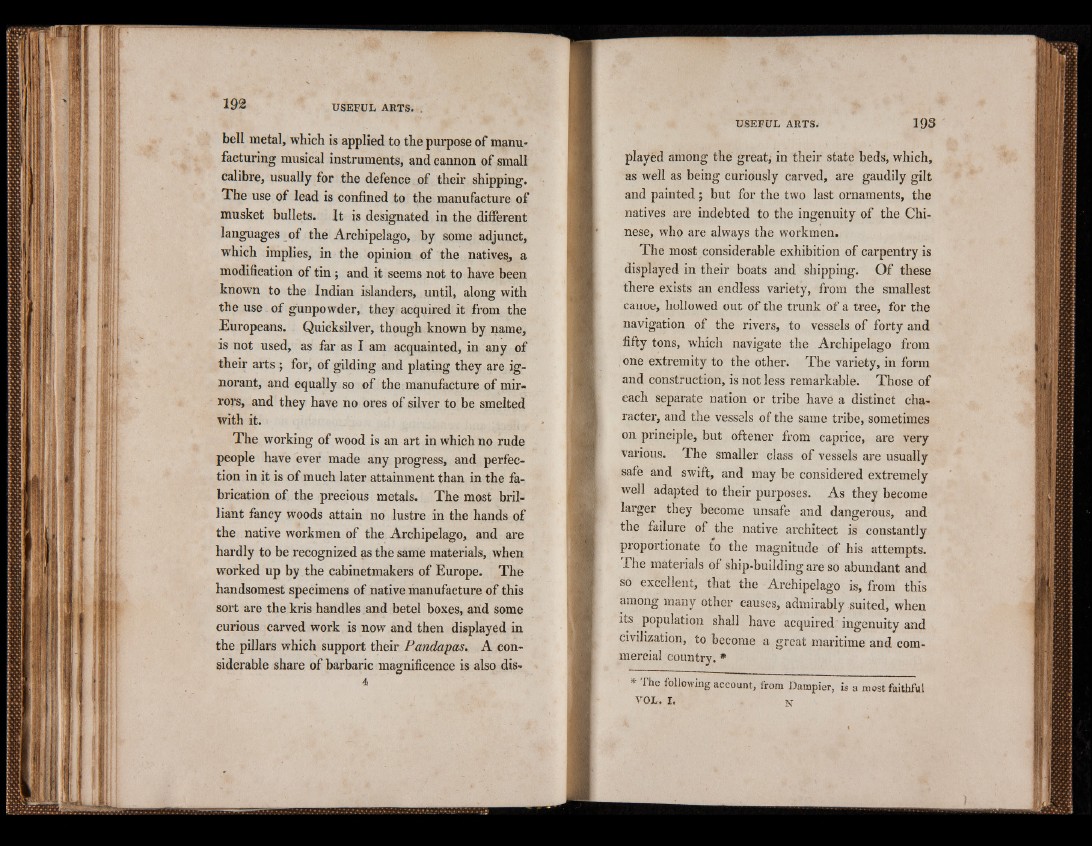
bell metal, which is applied to the purpose of manu*
facturing musical instruments, and cannon of small
calibre, usually for the defence of their shipping.
The use of lead is confined to the manufacture of
musket bullets. It is designated in the différent
languages of the Archipelago, by some adjunct,
which implies, in the opinion of the natives, a
modification of tin ; and it seems not to have been
known to the Indian islanders, until, along with
the use of gunpowder, they acquired it from the
Europeans. Quicksilver, though known by name,
is not used, as far as I am acquainted, in any of
their arts ; for, of gilding and plating they are ignorant,
and equally so of the manufacture of mirrors,
and they have no ores of silver to be smelted
with it.
The working of wood is an art in which no rude
people have ever made any progress, and perfection
in it is of much later attainment than in the fabrication
of the precious metals. The most brilliant
fancy woods attain no lustre in the hands of
the native workmen of the Archipelago, and are
hardly to be recognized as the same materials, when
worked up by the cabinetmakers of Europe. The
handsomest specimens of native manufacture of this
sort are the kris handles and betel boxes, and some
curious carved work is now and then displayed in
the pillars which support their Pandapas. A considerable
share of barbaric magnificence is also disU
SEFUL ARTS, 19S
played among the greats in their state beds, which,
as well as being curiously carved, are gaudily gilt
and painted; but for the two last ornaments, the
natives are indebted to the ingenuity of the Chinese,
who are always the workmen.
The most considerable exhibition of carpentry is
displayed in their boats and shipping. Of these
there exists an endless variety, from the smallest
canoe, hollowed out of the trunk of a tree, for the
navigation of the rivers, to vessels of forty and
fifty tons, which navigate the Archipelago from
one extremity to the other. The variety, in form
and construction, is not less remarkable. Those of
each separate nation or tribe have a distinct character,
and the vessels of the same tribe, sometimes
on principle, but oftener from caprice, are very
various. The smaller class of vessels are usually
safe and swift, and may be considered extremely
well adapted to their purposes. As they become
larger they become unsafe and dangerous, and
the failure of the native architect is constantly
proportionate to the magnitude of his attempts.
The materials of ship-building are so abundant and
so excellent, that the Archipelago is, from this
among many other causes, admirably suited, when
its population shall have acquired ingenuity and
civilization, to become a great maritime and commercial
country. *
* The following account, from Dampier, is a most faithful
VOL. I . N